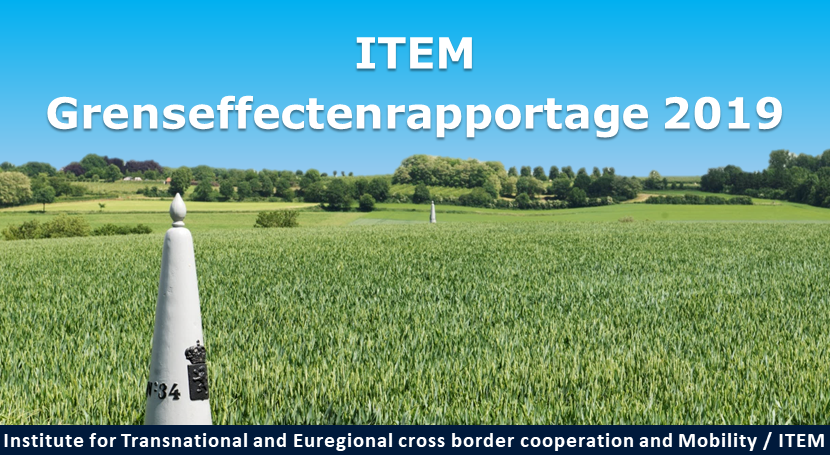ITEM announces dossiers for 2019 Cross-border Impact Assessment
The dossiers for the 2019 ITEM Cross-border Impact Assessment have been selected. The Cross-border Impact Assessment is one of ITEM's core activities, which investigates the effects of existing and future legislation and regulations on the border regions.
In December and January, ITEM's stakeholders were able to make new suggestions for dossiers, but also give their opinion on the dossiers proposed by ITEM. All dossier suggestions were evaluated by ITEM in the light of current events, the relationship to ITEM's research focus and the frequency of the problem. From all these suggestions, the following dossiers were selected:
90% rule: This dossier is a follow-up investigation into the border effects of the 90% rule. The rule applies to people who reside outside the Netherlands but still need to pay taxes there; they can only make use of the same tax deductions as residents of the Netherlands, if they earn at least 90% of their income in the Netherlands. The Cross-border Impact Assessment of 2017 already mapped how many people might be affected by the rule. In addition, the 2018 Cross-border Impact Assessment provided a first insight into the impact of the measure. As currently additional data are available, the scope of who may be affected by the 90% rule can be better analysed in the 2019 Impact Assessment.
European Cross-border Mechanism: In May 2018, the European Commission proposed the European Cross-border Mechanism so that conflict situations between conflicting legal provisions in border regions could be resolved. The Cross-border Mechanism should facilitate cross-border cooperation between parties for projects and services. This dossier assesses the potential benefits of the legislative proposal at the German-Dutch and Dutch-Flemish border regions. Furthermore, the effects for a selection of infrastructure projects in selected Euregions are mapped.
Nitrates Directive and manure quotas NL/DE: In 1991, the European Council already drew up a directive setting quotas for the use of nitrates and manure. This dossier focuses on the effects of this European Nitrates Directive and manure quotas. This dossier also examines current practice with regard to the import and export of manure and possible fraud at the Dutch-German border.
Cross-border data: Data collection has been a much debated topic in recent years. However, data collection is focused on the national level and it often ends at the border. This preliminary study investigates the possibilities to make cross-border data available.
Impacts on cross-border cohesion: It is the aim of many Euregional organisations and INTERREG programmes to improve cooperation and the territorial cohesion in cross-border regions. One important element of this has been the stimulation of positive perceptions of citizens, companies and the public sector of cross-border cooperation. However, many cross-border regions have difficulties to monitor and measure the perception of citizens and other stakeholders, the quality of cohesion and cross-border cooperation in a broader sense. There is in the first place uncertainty about the right indicators and data for doing so. In order to conduct in 2020 an impact assessment of the current INTERREG programmes with respect to its effects on cross-border cohesion, this dossier will develop a methodology in particular to measure the qualitative aspects of territorial cohesion with a special view on the perception of citizens, companies and public bodies.
Governance under the new Interreg Regulation: Interreg is a European Union programme that is committed to blurring borders in Europe. The new Interreg regulation for the programme period 2021-2027 states that each Interreg programme area must allocate at least 15% of the budget to governance. However, what is governance and what exactly is the goal of the 15% requirement? What are the expectations with respect to the programmes in the Benelux area? What could be the effect of this stronger emphasis on governance? What is the support today and how would the new regulation change the scope of the future programmes? An answer to these questions is given in this dossier.
Law on the normalisation of the legal status of civil servants: On 1 January 2020, the new Act on the Legal Status of Civil Servants will enter into force. This will have consequences for the tax and social security situation of civil servants who are frontier workers. This dossier maps out the effects of the new regulation.
The dossier research runs until October of this year. The results of the dossiers will be presented at the ITEM annual conference. The ITEM annual conference will take place this autumn.
About the ITEM Cross-border Impact Assessment
The ITEM Cross-border Impact Assessment is an annual report that covers a wide range of cross-border issues. The Cross-border Impact Assessment investigates the effects of existing and future legislation and regulations on the border regions. There is currently a lack of information regarding the (expected) effects of national and EU policies and legislation on border regions. ITEM's annual Cross-border Impact Assessment brings the effects to light. See the 2018 report.

Also read
-
Two Law PhD candidates of the Maastricht Faculty received awards for their doctoral theses during the 21st International Congress of the International Association of the Penal Law in Paris.
-
The competition is open to all students registered for a LLM programme in Maastricht who submits their thesis in the academic year 2023-2024.
-
On 6 June 2024, the Globalisation & Law Network held a seminar featuring Dr. Christina Eckes, Professor of European Law at the University of Amsterdam.


